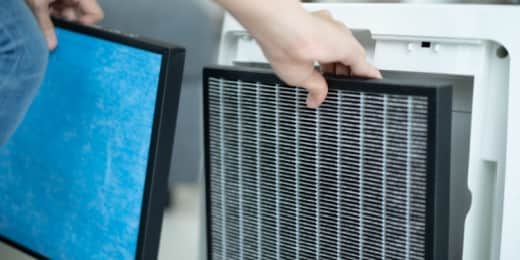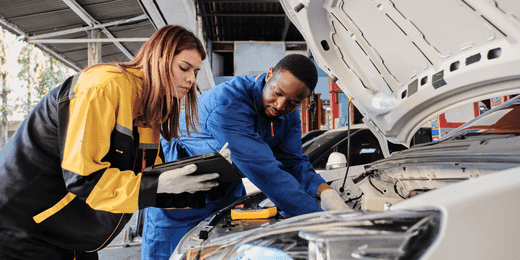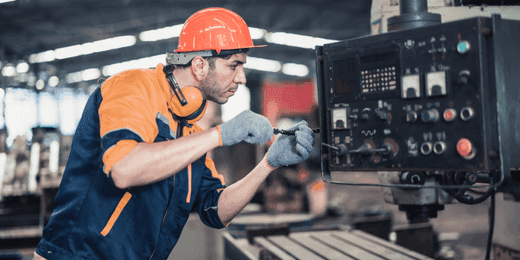A Brief Guide to HEPA Filter Maintenance
Your ultimate guide to HEPA filter maintenance, from how it’s done, to a checklist of best practices!

Published 31 Jan 2025
Article by
5 min read
What is HEPA Filter Maintenance?
HEPA filter maintenance is the process of checking, cleaning, and replacing High Efficiency Particulate Air (HEPA) filters. These filters are critical in Heating, Ventilation, and Air Conditioning (HVAC) systems, air purifiers, and vacuum cleaners as they trap fine particles. However, they also require regular maintenance for them to perform effectively, which is why it’s important to check HEPA filters regularly.
Importance
Maintaining HEPA filters is essential to ensure they continue to capture airborne particles like dust, allergens, and pathogens effectively, which promotes better indoor air quality. Regular cleaning or replacement prevents clogging, ensuring the filter operates efficiently and doesn’t strain the air system. Proper maintenance also extends the filter’s lifespan, saving money on frequent replacements and reducing environmental waste.
Achieve operational excellence
Cultivate a culture of excellence with our digital solutions that enhance efficiency, agility, and continuous improvement across all operations.
Benefits of a HEPA Filter
HEPA filters are very important for ensuring good air quality. These devices are adept at capturing fine airborne particles like dust, PM2.5, and more. To paint a clearer picture, here are some key benefits of using devices with a HEPA filter:
Improved Indoor Air Quality
HEPA filters are designed to capture 99.97% of airborne particles as small as 0.3 microns, including dust, pollen,mold spores, and pet dander. This leads to cleaner air, which is especially beneficial for people with allergies,asthma, or respiratory issues. By reducing these pollutants, HEPA filters help create a healthier and more comfortable indoor environment.
Reduction in Allergies
For individuals prone to allergies or sensitivities, HEPA filters effectively remove common allergens from the air. This minimizes exposure to triggers that cause sneezing, itchy eyes, and other allergic reactions. A HEPA-equipped system can significantly improve the quality of life for allergy sufferers by maintaining consistent allergen-free air.
Enhanced Odor Control
While HEPA filters primarily target particles, they also help reduce odors when paired with activated carbon layers in some systems. This is particularly useful in homes and workplaces with animals, smokers, or strong cooking smells. The ability to neutralize odors makes HEPA filters ideal for maintaining a fresher and more pleasant indoor environment.
Best Practices for HEPA Filter Maintenance
Proper HEPA filter maintenance is critical in ensuring that HEPA filters work properly and effectively, trapping harmful airborne particles. That said, performing maintenance can be a complicated task for teams that are new to the process.
Here are five best practices for cleaning and maintaining HEPA filters to remember when maintenance time comes around:
Conduct Maintenance Regularly
Performing routine maintenance ensures that HEPA filters in HVAC systems remain effective in capturing airborne particles and maintaining air quality. Regular inspections help identify clogs, wear, or damage before they compromise system performance or increase energy consumption. By sticking to a consistent schedule, organizations can extend the lifespan of filters and prevent costly breakdowns.
Leverage Technology
Digital solutions such as asset management tools are a great way to ensure maintenance is scheduled consistently and on time, while also making it easier to assign people in charge of the task. Teams can also leverage smart sensors that monitor air quality and provide real-time data to alert teams when filter performance begins to decline. This proactive approach minimizes downtime and ensures filters are serviced precisely when needed, enhancing operational efficiency.
Simplify maintenance scheduling for your business with SafetyCulture
Streamline your operations with usage-based maintenance using our intuitive management software.
Use the Right Tools
Specialized tools, such as industrial vacuums,pressure gauges, and cleaning solutions, are crucial for maintaining larger HEPA filters without causing damage. Incorrect tools can compromise the filter’s integrity, reducing its efficiency and increasing replacement costs. Having the appropriate equipment readily available ensures thorough maintenance and adheres to manufacturer guidelines.
Additionally, when in doubt figuring out the right tools for the job, always refer to the manufacturer’s recommendations.
Train Maintenance Staff
Proper training equips maintenance personnel with the knowledge to handle HEPA filters correctly, avoiding mishandling or damage. Staff should be trained on identifying wear and tear, using the correct tools, and following safe handling procedures for large HVAC systems. Well-trained teams reduce the likelihood of errors, ensuring filters perform optimally and meet air quality standards.
Create a Log of Maintenance Activities
Documenting maintenance activities helps track the performance and history of each HEPA filter, providing insights into usage patterns and maintenance needs. Logs also ensure compliance with organizational policies or regulatory requirements by providing a record of adherence to maintenance schedules. By keeping detailed records, organizations can streamline future planning and justify decisions about replacements or upgrades.
What to Look Out for During HEPA Filter Maintenance
Since maintaining HEPA filters can be a complicated task, having a checklist of things to do when maintaining these filters is essential. Teams can also digitize their maintenance checklists to make them easier for workers to access. This also ensures that workers have the information they need to perform maintenance tasks effectively.
To help, here’s a brief checklist of what to look out for when performing HEPA filter maintenance tasks:
Dirt, clogging, or physical damage to filters.
Airflow resistance in filters.
Status of disposable filters.
Gaps, signs of wear and tear, or damages to the HEPA filter housing.
Dust, dirt, and other contaminants in the external area of the HEPA filter.
In addition to keeping track of maintenance tasks, it is also essential to ensure the following:
Employees are properly trained on training on proper filter handling to avoid damage during cleaning or replacement.
Tools like industrial vacuums and pressure gauges are on hand and suitable for filter maintenance.
Maintenance logs are updated regularly.
Inspection dates, actions taken, and observed conditions are recorded digitally to track filter performance and plan future maintenance.
Specific maintenance procedures and replacement intervals as described by the product manual are followed for maximum compliance and efficiency.
Maintain HEPA Filters Efficiently with SafetyCulture
Why Use SafetyCulture?
SafetyCulture is a mobile-first operations platform adopted across industries such as manufacturing, mining, construction, retail, and hospitality. It’s designed to equip leaders and working teams with the knowledge and tools to do their best work—to the safest and highest standard.
Streamline processes, eliminate bottlenecks, enhance resource utilization, and build an agile and scalable infrastructure with SafetyCulture. Strive for operational excellence to boost competitive advantage, foster sustainable growth, and deliver long-term value.
✓ Save time and reduce costs ✓ Stay on top of risks and incidents ✓ Boost productivity and efficiency ✓ Enhance communication and collaboration ✓ Discover improvement opportunities ✓ Make data-driven business decisions
Related articles
Facility Management
Maintenance

A Guide to Retail Facility Management: Strategies for Efficiency & Sustainability
Improve store performance with effective retail facility management, and learn its key components, challenges, and top solutions for success.
Equipment Maintenance
Maintenance

Autonomous Vehicle Maintenance for Safety and Asset Performance
Discover how autonomous vehicle maintenance supports safety, reliability, and asset performance through preventative workflows.
Maintenance
Equipment Maintenance

Understanding Mechanical Integrity and Its Importance
Understand the meaning of mechanical integrity, its fundamental components, and how to develop a mechanical integrity plan for the team.